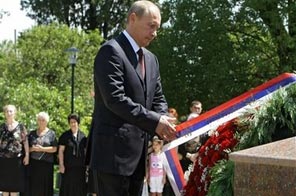Russia pledges economic, military aid to Abkhazia
SUKHUMI: Russia's Prime Minister Vladimir Putin visited the separatist Georgian region of Abkhazia on Wednesday, promising to provide nearly $500 million in military aid and shrugging off Georgian protests.
Putin's visit came on the anniversary of the cease-fire in last year's war with Georgia, during which Russian troops and separatist forces ousted Georgian forces from the territory of Abkhazia and another breakaway Georgian province, South Ossetia.
The Georgian Foreign Ministry strongly protested Putin's trip as "yet another attempt to destabilize the situation and escalate the tension in the Caucasus region."
After the war, Russia recognized both regions as independent, a move either denounced or ignored by all other countries except Nicaragua. Putin said Wednesday that Russia wouldn't change its mind.
"The situation has changed radically, and there will be no return to the past," he said.
Putin urged Russian businesses to invest in Abkhazia, adding that other nations "who are still waiting will come later and will simply pay more."
"Frankly speaking, Abkhazia doesn't need to be recognized by anyone but Russia," he said after the talks with Abkhazia's separatist leaders.
In an interview with the Abkhazian media published Wednesday, Putin accused Washington of forcing its allies to toe its line against Russia after the war.
"There are many who support us in the West," Putin said. "They all feel a certain pressure from the most powerful NATO member — the United States. After the end of the Cold War, some people in the United States got an illusion they don't have to follow any rules and do what they want."
He added on a less defiant note that now "all have come to realize that ... no country in the world can play the role of a global policeman."
The war in Georgia drove the Russian-U.S. ties to their lowest point since the Cold War times, and the issue remains an irritant in relations between Moscow and Washington despite President Barack Obama's efforts to improve ties with the Kremlin.
The Georgian Foreign Ministry said the visit to Abkhazia by Putin, whom it described as "the main initiator and ideologist of the war" against Georgia, demonstrated that "Russia continues to defy the internationally recognized norms and principles of international law, its own international commitments and reputation as well as the norms of civilized conduct."
Shortly after Putin left Abkhazia, a small explosive device blew up in a garbage container on Sukhumi's sea promenade, city police said. No one was hurt. Police would not speculate on who was responsible.
In recent weeks, both Russia and Georgia have trumpeted their competing versions of which side started the war.
Russia says it was responding to a Georgian assault on South Ossetia, whose residents mostly have Russian passports. Georgia says it was acting to repel invading Russian troops and accuses Russia of scheming to take over all of Georgia.
Putin dismissed suggestions that Russia's presence in Abkhazia and South Ossetia reflected imperial ambitions.
"These are small republics, small countries, but there are many such examples in the world. There is nothing exclusive in this," he said in an interview with the Abkhazian media.
Putin compared the Georgian breakaways to San Marino and Monaco. "All of them, these small European countries, have special relations with their neighbors," he said. San Marino and Monaco are microstates with strong relationships with Italy and France, respectively.
"Russia is providing and will provide economic, political and, if necessary, military assistance to Abkhazia," he said, adding that Russia will spend 15 billion to 16 billion rubles ($465 million to $495 million) next year for Abkhazian military bases and border-control projects.
Russia offered no details on its military base plans. Russian news reports have said the Russian Navy could relocate part of its Black Sea Fleet to the Abkhazian port of Ochamchira when its lease at Ukraine's Sevastopol expires in 2017.
Besides military spending, Putin said that Russia would provide 10.9 billion rubles ($330 million) in economic and social assistance to Abkhazia in 2010-2011. Abkhazia's isolation since its mid-1990s break from Georgia has devastated its tourism and its wider economy.






